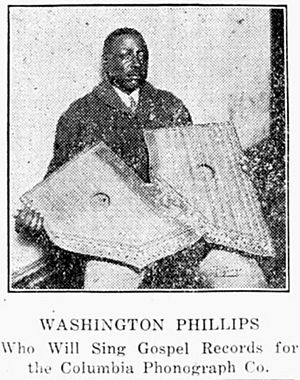Washington Phillips facts for kids
Quick facts for kids
Washington Phillips
|
|
|---|---|
 |
|
| Background information | |
| Birth name | George Washington Phillips |
| Born | January 11, 1880 Texas, U.S. (probably Freestone County) |
| Died | September 20, 1954 (aged 74) Teague, Texas, U.S. |
| Genres |
|
| Occupation(s) |
|
| Instruments |
|
| Years active | 1927–29 |
George Washington "Wash" Phillips (born January 11, 1880 – died September 20, 1954) was an American gospel and gospel blues singer. He also played a special instrument. What he played was called "novelty accompaniment" on his old records.
Contents
About Washington Phillips
Washington Phillips was born in Texas on January 11, 1880. His parents were Tim and Nancy Phillips.
People who knew him said he was about 5 feet 8 or 9 inches tall and had a strong build. He was a farmer and worked on about 30 to 40 acres of land near a place called Simsboro, close to Teague, Texas.
He was also known as a "jack-leg preacher." This means he was a preacher who wasn't officially ordained (made a minister). He would often speak to groups of people in the street or at small churches. He belonged to the Pleasant Hill Trinity Baptist Church in Simsboro. He also visited other churches like St. Paul Church of God In Christ and St. James Methodist Church.
His song "Denomination Blues" talks about how he didn't like it when different religious groups argued. He also sang about preachers who didn't practice what they preached. He believed in a simple and honest faith. The end of his song says:
It's right to stand together, it's wrong to stand apart,
'Cause none's going to heaven but the pure in heart. And that's all.
This means he thought people should work together and be kind.
Between 1927 and 1929, Washington Phillips recorded 18 songs. He made these recordings for Columbia Records in a special studio in Dallas, Texas. Frank B. Walker helped him with these recordings. Some of these songs were released on records, but others were not.
Washington Phillips passed away on September 20, 1954, in Teague. He was buried in an unmarked grave in Cotton Gin Cemetery. His wife, Marie, lived longer than him.
Some people have confused him with another Washington Phillips. There are also some stories that he was blind, but there is no real proof of this.
Washington Phillips' Unique Instruments
A photo from 1928 shows Washington Phillips holding two instruments that look like zithers. A zither is a stringed instrument that you play by plucking or strumming. The instruments he held were identified as a celestaphone and a phonoharp. These were types of hammered dulcimers, but Phillips played them by strumming and plucking, not by hitting the strings with hammers.
Frank B. Walker, who helped him record, once called Phillips' instrument a "dulceola." He said no one else could play it like Phillips. It seems Phillips might have made his own unique instruments from parts of broken ones.
In 2016, a journalist found an old newspaper article from 1907. It said that Phillips called his instrument a "manzarene." The article described it as a "box about 2x3 feet, 6 inches deep, [on] which he has strung violin strings, something on the order of an autoharp." It also said he used both hands to play it. This new information helped name a collection of his songs, Washington Phillips and His Manzarene Dreams.
Grammy Nominations
The album Washington Phillips and His Manzarene Dreams was nominated for two 2018 Grammy Awards. It was recognized for being a great historical album and for its excellent notes.
Discography
His Music Lives On
Many collections of Washington Phillips' songs have been released over the years. His music has also inspired many other artists. Here are some examples:
- Sister Rosetta Tharpe recorded "That's All" in 1938. This song was actually "Denomination Blues" with different words.
- Ry Cooder recorded Phillips' "Denomination Blues" on his 1971 album Into the Purple Valley. He also covered "You Can't Stop a Tattler" as "Tattler" in 1974. Linda Ronstadt later sang Cooder's version of "Tattler."
- "Denomination Blues" has also been recorded by Christian groups like 2nd Chapter of Acts and The 77s.
- Jorma Kaukonen recorded "What Are They Doing in Heaven Today" in 2002.
- Will Oldham (as Palace Brothers) and Gillian Welch both recorded "I Had a Good Father and Mother."
- The song "What Are They Doing in Heaven Today" was used in the movie Elizabethtown.
- The band Mogwai performed a version of "What Are They Doing in Heaven Today" for the soundtrack of the French TV series Les Revenants.
- The band Phish has performed "Paul and Silas in Jail" many times in their live shows.
- Phillips' song "I Am Born to Preach the Gospel" was featured in the 2009 film My Son, My Son, What Have Ye Done?.
- Ralph Stanley recorded "Lift Him Up That's All" in 2011.
- In 2009, Atlas Sound used a sample from Phillips' "Lift Him Up That's All" in their song "Washington School."
- Phillips' song "Mothers Last Word to Her Son" was used a lot in the movie We Need to Talk About Kevin.
- Saxophonist Colin Stetson covered "What Are They Doing in Heaven Today" with Bon Iver's Justin Vernon singing.
- Mavis Staples recorded "What Are They Doing in Heaven Today" in 2015.
- Kate Wolf recorded "I Had A Good Father and Mother" on her 1994 live album.
- Animal Collective performs a short version of "I’ve Got the Key to the Kingdom" before their song "The Purple Bottle" on a live album.
 | William L. Dawson |
 | W. E. B. Du Bois |
 | Harry Belafonte |

